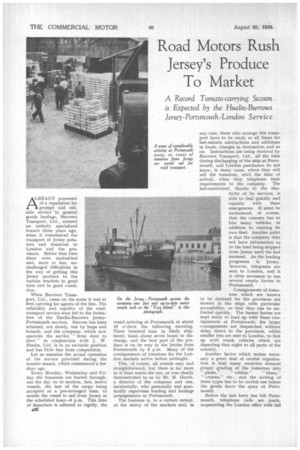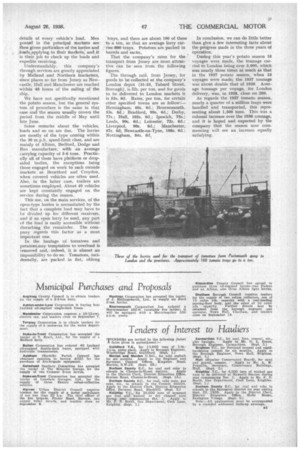Road Motors Rush Jersey's Produce To Market
Page 34

Page 35

If you've noticed an error in this article please click here to report it so we can fix it.
ALREADY possessed of a reputation for prompt and reliable service in general goods haulage, Burrows Transport, Ltd., entered an entirely specialized branch three years ago, when it commenced the transport of Jersey potatoes and tomatoes to London and the provinces. Before that time there were undoubted and, more or less, unchallenged difficulties in the way of getting this Jersey produce to the various markets in good time and in good condition.
When Burrows Transport, Ltd., came on the scene it was at first carrying for agents of the line. The reliability and rapidity of the roadtransport service soon led to the formation of the Huelin-Burrows JerseyPortsmouth services. Success has been attained, not slowly, but by leaps and bounds, and the epmpany, which now operates the service " from door to door " in conjunction with J. W. Huelin, Ltd, is in an enviable position and has little fear from competition.
Let us examine the actual operation of the service provided during the tomato season, which commenced a few days ago.
Every Monday, Wednesday and Friday the tomatoes are loaded throughout the day on to modern, fast, motor vessels, the last of the cargo being accepted at .a pm-arranged time, to enable the vessel to sail from Jersey at the scheduled hour-9 p.m. This time of departure is adhered to rigidly, the Ail2 vessel arriving at Portsmouth at about 10 o'clock the following morning. Three hundred tons (a likely shipment) takes about seven hours to discharge, and the best part of the produce is on its way in the lorries from Portsmouth by 8 p.m. Many of the consignments of tomatoes for the London markets arrive before midnight.
This, of course, all sounds easy and straightforward, but there is far more in it than meets the eye, as was clearly demonstrated to us by Mr. M. Harris. a director of the company and one, incidentally, who personally and practically supervises loading and haulage arrangements at Portsmouth.
The business is, to a certain extent, at the mercy of the markets and, in
any case, those who arrange this transport have to be ready at all times for last-minute subtractions and additions in loads, changes in destination and so on. Instructions are being received by Burrows Transport, Ltd., all the time during discharging of the ship at Portsmouth, and London purchasers do not know, in many cases, where they will sell the tomatoes, until the time of arrival, when they telephone their requirements to the company. The last-mentioned, thanks to the elasticity of its services, is able to deal quickly and capably with these emergencies, It must be understood, of course, that the concern has to hire many vehicles, in addition to running its own fleet. Another point is that the company, does not have information as to the load being shipped from Jersey until the last moment. As the loading progresses in Jersey, however, telegrams are sent to London, and it is often necessary to run several empty lorries to Portsmouth.
Consignments of tomatoes which are known to be destined for the provinces are stowed in the ships with particular accessibility, so that they can be unloaded quickly. The fastest lorries are kept ready to load up with these consignments at Portsmouth; the larger consignments are despatched without delay direct to the provinces, whilst smaller lots are sent to London, to link up with trunk vehicles which are departing that night to all parts of the country.
Another factor which makes necessary a great deal of careful organization is that many receivers demand proper grading of the tomatoes into "pinks." "whites," "blues," " crosses," etc., and the sorting of these types has to be carried out before the goods leave the quay at Portsmouth.
Before the last lorry has left Portsmouth, telephone calls are made, acquainting the London office with full details of every vehicle's load. Men posted in the principal nsarkets are then given particulars of the lorries and loads applying to their markets, and it is their job to check up the loads and expedite receiving.
Understandably, this company's through services are greatly appreciated by Midland and Northern marketers, since places so far from Jersey as Newcastle, Hull and Manchester are reached within 48 hours of the sailing of the ship.
We have not specifically mentioned the potato season, but the general system of procedure is the same in that case and the season usually covers the period from the middle of May until late June.
Some remarks about the vehicles, loads and so on are due. The lorries are mostly of the type coming within the 30 m.p.h. speed-limit class, and are mainly of Albion, Bedford, Dodge and
eo manufacture, with an average carrying capacity of 5-6 tons, Practically all of them have platform or dropsided bodies, the exceptions being those engaged on work to such outside markets as Brentford and Croydon, when covered vehicles are often used. Also, in the latter case, trailers are sometimes employed. About 40 vehicles are kept constantly engaged on the service during the season.
This use, on the main services, of the open-type lorries is necessitated by the fact that a complete load may have to be divided up for different receivers, and if an open lorry be used, any part of the load is easily accessible without disturbing the remainder. The company regards this factor as a most important one.
In the haulage of tomatoes and potatoestany temptation to overload is removed and, indeed, it is almost an impossibility to do so. Tomatoes, incidentally. are packed in fiat, oblong
'trays, and there are about 160 of these to a ton, so that an average lorry carries 800 trays. Potatoes are packed in barrels and sacks.
That the company's rates for the transport from Jersey are most attractive can be seen from the following figures.
The through rat, from Jersey, for goods to be collected at the company's London depot (31-33, Tabard Street, Borough), is 52s. per ton, and for goods to be delivered to London markets it is 53s. 6d. Rates, per ton, for certain other specified towns are as follow:Birmingham, 66s. 6d,; Bournemouth, 53s. 6d.: Bradford, 99s. fid.; Derby, 77s,; Hull, 102s. fid.; Ipswich, 75s.; Leeds, 99s. 6d.; Leicester, 72s. 6d.; Liverpool, 90s. 6d.; Manchester, 97s. 6d; Newcastle-on-Tyne, 108s. 6c1.; Nottingham, 84s. 6d: In conclusion, we can do little better than give a few interesting facts about the progress made in the three years of operation.
During this year's potato season 16 voyages were made, the tonnage carried to London being over 3,000, which was nearly three times as much as that in the 1937 potato season, when 13 voyages were made; the 1937 tonnage was about double that of 1936. Average tonnage per voyage, for London delivery, was. in 1938, close on 200.
As regards the 1937 tomato season, nearly a quarter of a million trays were handled and transported, this representing about 1,500 tons. This was a colossal increase over the 1936 tonnage,
and it is hoped and expected by the company that the season now commencing will see an increase equally satisfying.




















































































